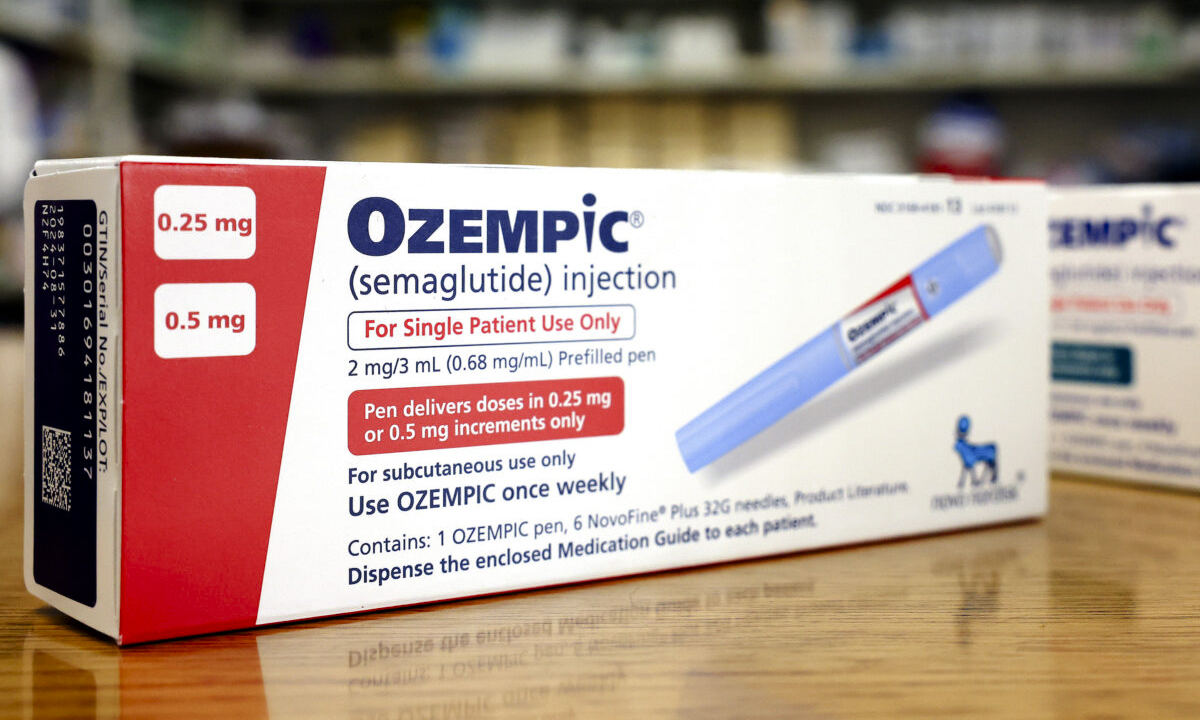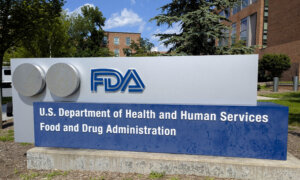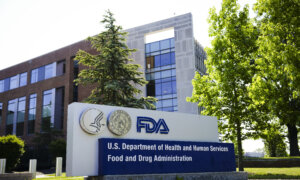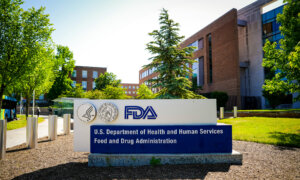Individuals who take Ozempic and similar weight loss drugs prior to undergoing medical procedures involving sedation face a higher risk of lung infection, according to a recent study.
The peer-reviewed study, published in the Cureus journal on Aug. 6, investigated the incidences of aspiration and pneumonia among patients taking GLP-1 drugs including Ozempic and Wegovy. Aspiration happens when food enters the lungs instead of being swallowed.
Researchers looked at data from more than 59,000 GLP-1 patients and compared it to over 5.89 million individuals who never took such drugs. They found a “small risk of aspiration pneumonitis” among sedated patients on GLP-1 drugs undergoing a gastrointestinal test.
Aspiration pneumonitis is a lung infection caused by inhaling things like food, liquid, vomit, or saliva. Though small, the risk was found to be “significantly increased” compared to people not taking these drugs.
A total of 10 people from the GLP-1 group developed aspiration pneumonitis within 24 hours of the test, compared to zero individuals in the other group. Similar results were also seen within 48 hours after the test.
GLP-1 drugs have a side effect of delayed gastric emptying, which “may increase the aspiration risk of gastric contents, especially during procedures that require sedation,” the researchers wrote.
“Despite its uncommon occurrence, aspiration is a significant adverse event and can result in life-threatening complications such as pneumonia and respiratory failure.”
The results of the study do not apply to people who take GLP-1 drugs and undergo surgery under light or moderate sedation, the researchers noted.
Researchers suggested that more detailed studies are required to fully understand the impact of specific GLP-1 drugs on gastric emptying and the risk of aspiration.
The authors declared no financial support from any organization for the work or any conflicts of interest.
A spokesperson from Novo Nordisk, the manufacturer of Ozempic and Wegovy, dismissed the concerns raised by the study.
The spokesperson said the European Medicines Agency’s (EMA) Pharmacovigilance Risk Assessment Committee (PRAC), on July 12, “concluded that a causal association between GLP-1 RAs and aspiration could not be established.”
“However, given the documented delayed gastric emptying effects observed in clinical trials and post-marketing cases, PRAC has recommended that healthcare professionals and patients should be informed about the potential consequence of delayed gastric emptying” during surgery periods, the spokesperson said in an emailed statement.
The representative pointed out that delayed gastric emptying for Novo Nordisk GLP-1 drugs is listed as occurring in “uncommon” frequency by the EU Summary of Product Characteristics and the United States Prescribing Information.
Experts Weigh In
In an Aug. 8 interview with The Epoch Times, Dr. Girish P. Joshi, vice-chair of the committee on practice parameters, American Society of Anesthesiologists (ASA) and professor of anesthesiology and pain management at the University of Texas Southwestern Medical Center at Dallas, Texas, praised the new study for using “appropriate” International Classification of Diseases codes to detect the presence of aspiration, and using the data of 59,000 patients.
“So, as far as aspiration data is concerned, and findings, I believe these numbers,” he said.
However, Joshi questioned the reliability of the study when it came to the consequences of aspiration, specifically its findings on respiratory failure and ICU admissions.
“The number of patients with respiratory failure or ICU admission in the control group is 21, while patients with aspiration was zero,” he said. “So, how can you have no patient with aspiration but then 21 patients with respiration failure? It doesn’t make sense.”
Dr. Richard Bartlett, a medical practitioner from Texas, raised concerns about GLP-1 drugs slowing down the gastrointestinal (GI) tract.
These medications are designed to slow down the emptying of the stomach, he told The Epoch Times in an interview on Aug. 8. “When you slow the stomach emptying and you slow the whole GI tract, you’re going to be pushing everything to one end of the spectrum, where you’re going to be at increased risk of problems like constipation, abdominal cramping, and as this study shows, potentially reflux,” he said.
“And even a reflux will increase the risk of potential aspiration, which is a real concern when you’re doing elective procedures or even emergency procedures. This is a risk that would potentially increase the risk of aspiration pneumonia, which is something that we see from time to time.”
Bartlett pointed out that GLP-1 drugs force people not to eat as much and make them feel “very bad” when they actually consume too much food.
“Instead of torturing yourself with these types of medicines that make you feel miserable when you eat too much, it would be less miserable to just eat less” and not face the side effects of these drugs, he stated.
GLP-1 Guidance Before Surgery
The ASA issued guidance last year on dealing with patients undergoing anesthesia or deep sedation who take GLP-1 drugs. Such patients are at a higher risk of “regurgitation and pulmonary aspiration of gastric contents” while sedated, it said.
The ASA recommended that patients on daily dosage of GLP-1 drugs consider not taking them during the day of surgery. Those who are on a weekly dosage were asked not to take the drug a week before the procedure.
People who experience gastrointestinal symptoms such as severe nausea, vomiting, retching, abdominal bloating, or abdominal pain should delay the procedure, the organization stated.
Meanwhile, research published by a team at Stanford University in April dismisses concerns about GLP-1 drugs and the risk of aspiration.
The scientists analyzed data from an insurance database of roughly 250 million people, evaluating people with type 2 diabetes who were prescribed GLP-1 drugs.
They found that the risk of respiratory complications after surgery was 3.5 percent among those who took the medications compared to 4 percent for individuals who did not use them. As such, the researchers concluded that GLP-1 drugs did not pose any special risk of aspiration for patients undergoing surgeries.
“We were surprised by our findings given many case reports of patients who had recently taken GLP-1 receptor agonists and had a large volume of gastric contents found under anesthesia, even if they had appropriately withheld these medications and fasted for the recommended times before surgery,” said Dr. Anjali Dixit, the lead author of the study and postdoctoral scholar in anesthesiology, perioperative and pain medicine at Stanford Medicine.
The study noted that forcing people to withhold their medications can also create adverse effects. People who are made to cancel their drug schedule may have to deal with the burdens created as a consequence of canceled surgeries and delayed care, it said.


















